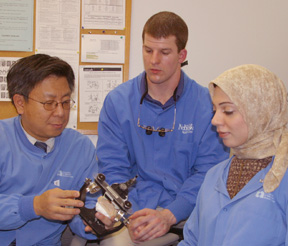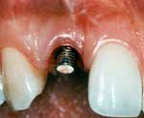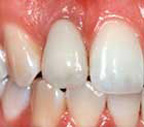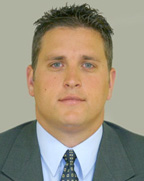Responding to increasing demand from Nebraska patients for dental implants, the UNMC College of Dentistry developed a program last fall to train undergraduate dental students in dental implants procedures. The college recently has had its first undergraduate students place implants in patients.
 |
(Photo by Peggy Cain) From left to right: Brian Chang, D.D.S., assistant professor, UNMC College of Dentistry and dental students, Brad Alderman and Zeena Al-Timimi examine a dental model. Dr. Chang is one of the several faculty members credited with launching a program to train undergraduate dental students in dental implants procedures. |
The college has been providing graduate level specialty training in implants for more than 10 years. Providing implants typically was an area of practice reserved for specialists, but now an increasing number of general dentists are performing some implant procedures.
Brian Chang, D.D.S., assistant professor in UNMC College of Dentistry department of adult restorative dentistry, spearheaded the development of the academic, laboratory and clinical components of the new training program. Although a few undergraduate students have performed dental implants in the past, this marks the beginning of clinical work of the program that began in September 2002.
“The students are excited to have this course, Dr. Chang said. “This is a new area for teaching in dental schools. It also means getting faculty qualified in teaching this course. It was a challenge to prepare this course. There are no guidelines to prepare it.”
Implant therapy at the college is a new focus that has involved through vision of the dean and hard work in course preparation and program implementation, especially by Dr. Chang, Sree Koka, D.D.S., Daniel A Assad, D.D.S., Randy Toothaker, D.D.S., Bruce Bavitz, D.M.D., and others.
Dental faculty say with any dental procedure there is risk, which makes formal training in implant procedures important for future general dentists.
Dental implants, one option for replacement of lost teeth that have been in use for the past 15 to 20 years, are usually titanium implant fixtures (metal-like posts) that are surgically placed in the bone of the upper or lower jaw, beneath the gum tissue. Once the gum heals, the replacement tooth or crown is attached to the implant fixture. Implants also can secure bridges and dentures when more than one tooth is missing.
 |  |
This titanium post was surgically placed in the upper jaw. | A replacement tooth is attached to the implant fixture. |
Though more expensive — one dental implant can run $3,000 in a private practice setting — many patients prefer them rather than dentures. Implants allow patients the ability to chew better, like having a real tooth. Dentures sometimes move and slip.
“Our students need this training, and we get requests from general dentists to have continuing education on implants so they can learn to do implants,” Dr. Chang said. “They didn’t have this education available to them when they went through school.”
Dan Hauck, senior dental student, was the first undergraduate student to install dental implants in a patient under the new implant pre-clinical and clinical curriculum. He finds the education practical.
 |
Dan Hauck |
“I’m going out into rural Wyoming and wanted to be able to provide this service,” Hauck said. “There won’t be a lot of specialists I can refer my patients to. In addition, my patients would have to drive several hours to get the same care. It’s something I can do and save patients time, money and traveling.
“Bottom dentures sometimes slip and slide. They’re not very stable. With implants, patients can chew properly and they won’t come out.”
Travis Lambert, who is graduating next year, said he did his first implant on a patient last month. “A lot of patients are going to be asking for this service after I get into practice. If I’d wait until then to get the education, I’d have to do it as part of continuing education,” Lambert said. “This course brings us up to speed. I was impressed at how pleased the patient was with the implant.”
“We as dental students need to have the education,” Hauck said. “A lot of things can contribute to the failure of implants to work, including the technique so all dentists need to be qualified to do implants.”